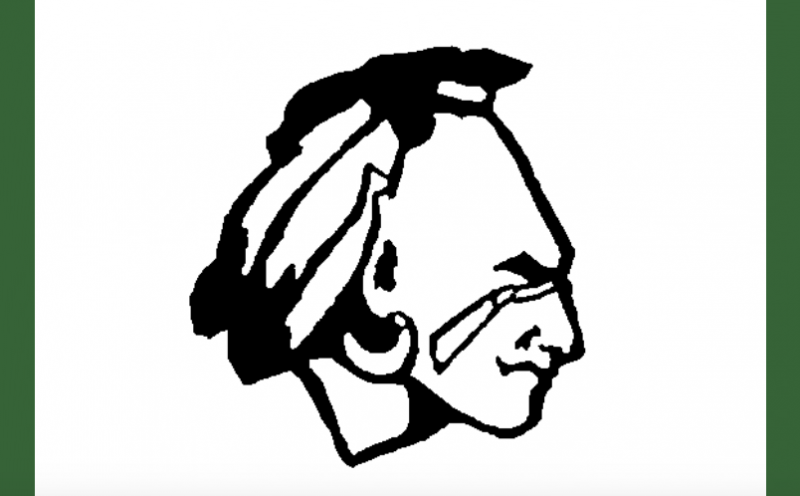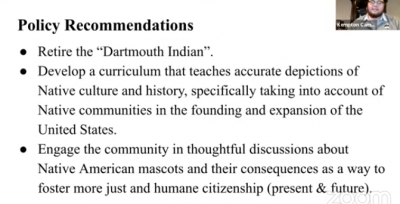Remove Indian mascot, speakers tell subcommittee
The Dartmouth Indian mascot should be retired, a recent Dartmouth High School graduate told members of the Equality and Diversity Subcommittee at their June 22 meeting.
The Indian mascot reduces indigenous people’s identity “to a caricature,’’ said Kempton Campbell, a 2019 Dartmouth High graduate who authored an independent study on mascots during his spring 2021 semester at the University of Connecticut.
He was one of two speakers at the meeting to call for the removal of the mascot.
The mascot “leads to an environment more conducive to further stereotypes,’’ he said.
The subcommittee was formed by the School Committee to explore diversity-related issues. A major focus of their work involves recommending to the School Committee whether to maintain or abolish the Dartmouth Indian mascot.
The logo issue has come up repeatedly in recent years, with sports teams and brands nationwide reexamining their minority representation and bills prohibiting Native American mascots for public schools introduced in the state legislature last year.
Dr. LaSella Hall, the president of the National Association for the Advancement of Colored People New Bedford, wrote to school officials in March expressing his organization’s frustration with inaction on the issue.
In his letter, Hall included a list of 15 Massachusetts school districts that have already retired their Indian mascots, including Barnstable, Braintree, Hanover, and Pentucket.
He wrote that mascots create a negative environment for indigenous people and noted that the school district has not consulted any tribal leadership on the issue.
Dr. Laurel Davis-Delano, a sociologist who has studied Indian mascots for more than 25 years, told the subcommittee that studies found exposing indigenous youth to mascots such as the Dartmouth Indian creates stress, distress, depression, hostility and dysphoria.
The mascots also lead to Native American youth having lower self-esteem, a reduced capacity to imagine future accomplishments for themselves, and less confidence in their community’s ability to make a difference, she said.
Davis-Delano noted that most Indian mascots are male and reflect the masculine role of chief or warrior, which overlooks the varied roles that community members play.
“They’re erasing huge aspects of people’s lives,’’ she said.
Nearly 600 recognized tribal nations live in the United States, she said, and “all have different cultures.’’ The Indian mascot represents “a Hollywood version of pseudo-native culture,’’ she added.
Campbell noted that the Indian came into prominence in the 1950s and that the mascot as it is currently depicted was created about 1974.
Prior to the 1950s, school uniforms simply carried the name “Dartmouth,’’ which he said countered the argument that the Indian has always been associated with the school.
The Dartmouth High alumnus argued that retiring the mascot is only a first step, adding that schools should also “develop a curriculum that teaches accurate depictions of native culture and history.”
He also wants the community to be engaged in “thoughtful discussion’’ on the topic to “foster a more just and humane citizenship.’’
Davis-Delano discouraged the committee from seeking public opinion on the issue.
This “implies that non-native people should be making decisions about representations that are not them,’’ she said.
She added that basing decisions on community viewpoints also “ignores the research findings.”
“If you have a mascot that’s this divisive, then how can it ever truly achieve the purpose of a mascot to begin with, which is to rally a school?’’ Dartmouth High principal Ross Thibault said.
The next Equality and Diversity Subcommittee meeting is at 6:30 p.m. July 13. Committee Chair Dr. Shannon Jenkins said members will ponder their next steps and might make a recommendation on the mascot issue.












